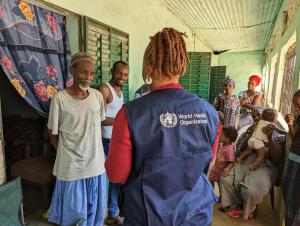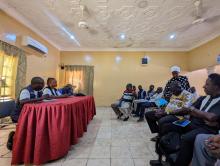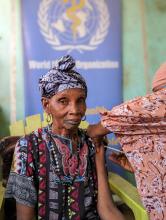From Skepticism to Smile: A Personal Journey with WHO's Vaccination Team in Basse
Basse, The Gambia - The heat was intense as the WHO team made their way through the unpaved, bumpy roads to Basse, a small town lying along the southern bank of the River Gambia. After nearly eight hours on the road, they finally arrived at the Arabic school where they were scheduled to meet with community members.
It was there that they met Abdul, a farmer who was well known in his community as one of the village elders and key community members. Abdul had been drinking attaya, a local concoction brewed from Chinese gunpowder tea, when he noticed the gathering of people and commotion at the school and stopped by to inquire what was happening.
The team consisted of Aziza Amina Sahid, a risk communication and community engagement officer, and Dr. Michael “Mike” Mulowooza, a vaccine rollout officer, who were there as part of the COVID-19 vaccination campaign supported by WHO. They hoped to target people like Abdul with their campaign as his sway in the community could prompt more members to get vaccinated.
Abdul, however, was skeptical about the vaccine and COVID-19 in general. "This attaya will keep me healthy, fit, and strong," he said while sipping his local concoction. He believed that the campaign and the vaccines were just another way for the government to make money for themselves. "Why else would they have locked down the whole country when we didn't even have that many deaths in our community?" he argued. He had seen all the posts on social media that argued how COVID-19 was nothing but a hoax, the Tik Tok videos his young daughter watched with homemade remedies for the virus, his Facebook feed filled with discussions about how the government had inflated COVID-19 deaths, and he was on a WhatsApp group with others who shared stories of people developing weird diseases after getting the vaccine.
Aziza decided to share her own story with the farmer. She was herself infected by the virus at a time when the vaccine was not yet available. She described her experience of the disease and how difficult it was for her to recover. Aziza had contracted COVID-19 before the vaccine was available, and she had a bad infection that landed her in the hospital in Sierra Leone. By June, she was still in critical condition and needed to be sent to Ghana for treatment since her own country's hospital systems were overwhelmed. It wasn't until August that she was able to fully recover.
Abdul was stunned. Aziza's story had profound impact on him. He was shocked to hear about her ordeal and how close she came to losing her life. “You don’t look like someone who was that ill,” he said with a bewildered look in his eyes. Aziza showed him the site on her arm where she had received four vaccine shots - two regular doses and two booster doses. She explained to him that the vaccines had given her a new lease on life.
Dr. Mike assured Abdul that the vaccine was harmless and explained that he would feel some pain in the injection site and experience fatigue. As he was a relatively healthy man with no other co-morbidities, the worst he would feel were the side-effects. Upon hearing this, Abdul rolled up his sleeves and asked for the jab. “I’m ready for my vaccine,” he said with enthusiasm to Aziza and the rest of the team.
The WHO team's work in Basse was more than just a vaccination campaign. They made a personal connection with Abdul, and this made all the difference. Aziza's story of COVID-19 was a powerful one, and Abdul could relate to it. She was a face he could put to the COVID-19 pandemic, and when he connected with her, the vaccine was no longer an unknown. It was the gift of life that was granted to her and millions of others around the globe and in The Gambia who were able to ride out the pandemic.
"Without this, many, including myself, would not be here today," says Aziza, reflecting on her experience in Basse. "And after hearing my story, this became a reality for Abdul." On that day, Abdul got his first dose of the Pfizer-made Covid-19 vaccine, generously donated to The Gambia by the government of Germany. In the months to follow, he will be followed up by health workers in his community for his second dose of the vaccine.
By the end of the 9-day vaccine campaign, the team had been able to vaccinate over 189,865 people in The Gambia – one of the best COVID-19 vaccination campaigns in the country to date. The impact of the WHO team's work and the personal connection made with Abdul is immeasurable. Not only did they vaccinate a significant number of people, but they also changed the minds of people like Abdul, who were once skeptical of the vaccine. The team left Basse that day feeling grateful for the opportunity to make a difference in people's lives. As they drove away, they could see Abdul waving goodbye, the smile on his face proof that sometimes, all it takes is a personal connection to change someone's mind.


